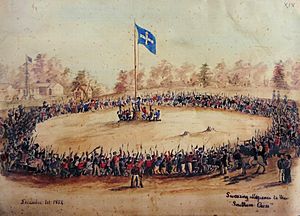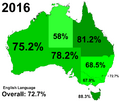Australian English facts for kids

Australian English is the kind of English language used in Australia. It has its own special sound and words that make it unique.
Contents
How Australian English Started
People from Britain and Ireland first arrived in Australia in 1788. They settled in a new colony called New South Wales. These early settlers spoke different kinds of English, called dialects. Over time, these dialects mixed together. This led to a new, unique Australian accent and a new set of words.
More people moved to Australia in the 1800s and 1900s. Many came hoping to find gold. Some were from Britain and Ireland. Others came from countries where English was not spoken. As more people arrived, Australian English kept growing and changing.
American English also had an impact. During the Second World War, many American soldiers stayed in Australia. Since the 1950s, American television shows and music have also been very popular. This helped to bring some American words and sounds into Australian English.
The Australian Accent
The Australian accent sounds a lot like the New Zealand accent.
In Australian English, the 'r' sound is only heard before a vowel. This means some words that sound different in other accents sound the same in Australia. For example:
- caught and court
- raw and roar
- aunt and aren't
- formally and formerly
Some Australian English vowel sounds are different too. For example, the vowel in day starts with a very open mouth. This makes the Australian day sound similar to how most British or American people say die. However, days of the week often sound different. The day part sounds more like dee:
- Sunday becomes Sun-dee
- Monday becomes Mun-dee
- Tuesday becomes Choose-dee
- Wednesday becomes Wens-dee
- Thursday becomes Thurs-dee
- Friday becomes Fri-dee
- Saturday becomes Satta-dee or Sadda-dee
Australian English also has some vowel sounds not found in other types of English. For example, bad and lad do not rhyme. Bad has a longer vowel sound than lad. Also, cot does not sound like caught, and bother does not rhyme with father.
Just like in American English, the 't' sound can sometimes sound like a 'd'. This often happens between vowels. For example:
- waiter can sound like wader
- betting can sound like bedding
- got it can sound like god it
- thirty can sound like thirdy
Also, when a 't' sound is followed by a 'you' sound, it can sound like chew. When a 'd' sound is followed by a 'you' sound, it can sound like Jew. Here are some examples:
- Tuesday and choose day
- lightyear and lie cheer
- due and Jew
- dune and June
Australians say wh and w the same way. For example:
- which and witch
- whether and weather
- whales and Wales
Unique Australian Words
Australians use many words that other English speakers might not know. A famous Australian greeting is G'day!, which means "Good day!". A native forest is called the bush, and the middle of Australia is known as the outback.
Many words came to Australia from Britain and Ireland. For example, mate, meaning "friend," is still used in Britain. Some of these words have changed their meaning in Australia.
A few words come from Australian Aboriginal languages. These are mostly names for animals, plants, and places. Some examples are dingo and kangaroo.
Sometimes, we don't know where a word came from. For instance, dinkum or fair dinkum means "true" or "is that true?". No one is sure if it came from Chinese or from England.
Australian Spelling
Australian spelling mostly follows British spelling. For words like organise or realise, the spelling -ise is common. For words like colour or favourite, -our is the usual spelling. However, some nouns, like the Labor Party or Victor Harbor, use -or. Words like program and jail are more common than programme and gaol.
Different Kinds of Australian English
Most linguists (people who study language) divide Australian English into three main types: Broad, General, and Cultivated.
- Broad Australian English sounds very strongly Australian. You can hear it when Steve Irwin spoke.
- General Australian English is the most common type. Most Australians use it, and you can hear it in Australian movies and TV shows. Hugh Jackman and Nicole Kidman speak General Australian English.
- Cultivated Australian English is similar to "Received Pronunciation," a type of British English spoken by people like David Attenborough. Cate Blanchett and Geoffrey Rush speak Cultivated Australian English.
There are also small differences in how people say words across Australia. For example, the 'a' sound in words like castle or dance can vary. Some people use the vowel sound from calm, while others use the vowel sound from mat.
Words can also have different meanings in different parts of Australia. For example, football (or footy) means "rugby" in New South Wales and Queensland. But in other parts of Australia, it means "Australian rules football". Also, a swimming costume is called a cossie or swimmers in New South Wales, togs in Queensland, and bathers in Victoria.
Images for kids
-
Bush poets such as Banjo Paterson captured the Australian vocabulary of the 19th century in their bush ballads.
See also
 In Spanish: Inglés australiano para niños
In Spanish: Inglés australiano para niños
 | Precious Adams |
 | Lauren Anderson |
 | Janet Collins |




